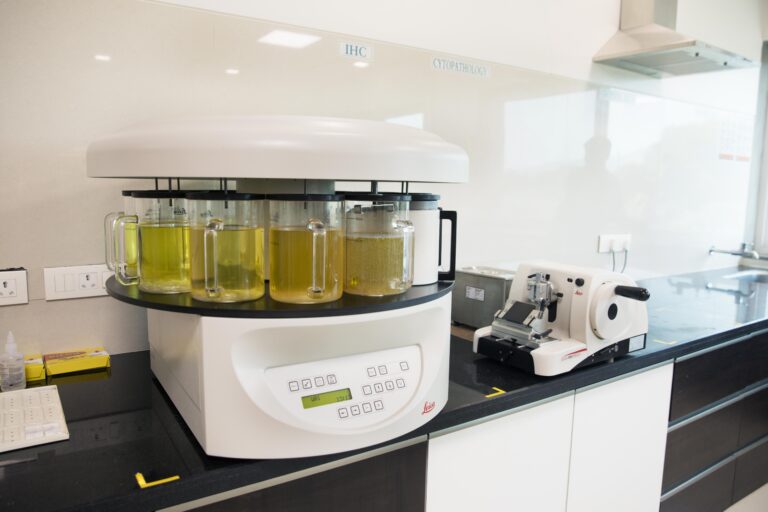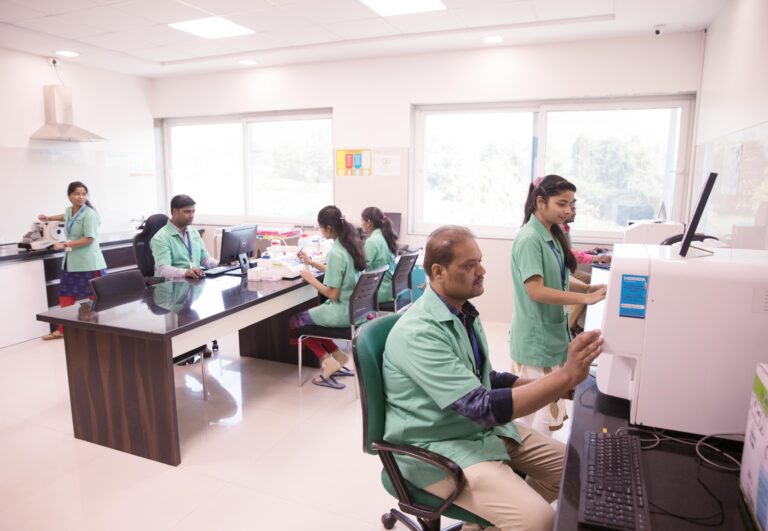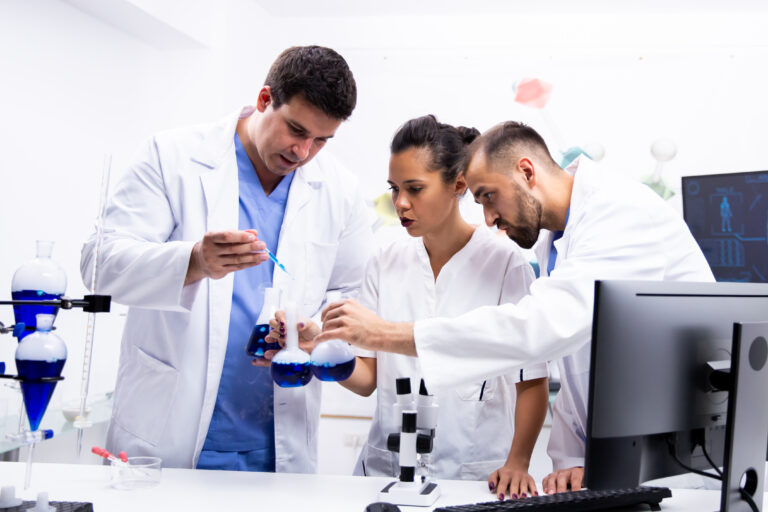Clinical Pathology in Talegaon
- Home
- Clinical Pathology in Talegaon



Clinical Pathology at TGH TGH Onco-Life Cancer Centre
Accurate Diagnosis. Informed Treatment. Better Healing.
Behind every effective cancer treatment is a correct diagnosis. At TGH TGH Onco-Life Cancer Centre, our Clinical Pathology Department plays a critical role in detecting diseases, guiding treatment decisions, and helping doctors understand what’s happening inside your body — all by studying your blood, urine, tissues, and cells.
What is Clinical Pathology?
Clinical Pathology is the science of examining body fluids and tissues in the lab to:
- Diagnose illnesses
- Monitor health and treatment progress
- Prevent complications
It bridges the gap between lab science and patient care, helping your doctors choose the right treatment at the right time.
Whether it’s a routine blood test or a complex biopsy analysis, clinical pathology provides the answers that save lives.
What Samples Do We Test?
Our lab examines a wide variety of samples, including:
- Blood – to check for infections, anemia, cancer cells, and more
- Urine – to detect kidney problems, infections, or metabolic disorders
- Tissue & Cell Samples – collected through biopsy or fine-needle aspiration to identify abnormal or cancerous cells
- Body Fluids – such as sputum, cerebrospinal fluid, or pleural fluid for signs of disease
These samples reveal early signs of disease, track how well treatment is working, and help doctors plan next steps.
Why Clinical Pathology is Important in Cancer Care
At a cancer centre like ours, clinical pathology is central to every stage of care:
- Early Detection
- Helps identify cancers even before symptoms appear
- Detects subtle changes in cell structure or blood chemistry
- Accurate Diagnosis
- Confirms whether a tumour is cancerous or benign
- Identifies the type and stage of cancer
- Treatment Planning
- Provides details that guide oncologists in selecting chemotherapy, radiation, or surgery
- Helps personalize treatment to each patient
- Monitoring Progress
- Regular lab tests show how the body is responding to treatment
- Helps doctors decide whether to continue, stop, or adjust the treatment plan
- Detecting Recurrence
- Follow-up tests help check if cancer has returned after treatment
Advanced Diagnostic Facilities at Onco-Life
Our state-of-the-art Clinical Pathology Lab offers:
- Fully automated analyzers for faster and more accurate reports
- Digital pathology for better microscopic imaging
- Quality-controlled systems to ensure precise and reliable results
- Real-time coordination with oncology teams for quicker treatment decisions
All reports are handled by experienced pathologists with deep expertise in cancer diagnosis.
Common Tests Performed in Our Lab
- Complete Blood Count (CBC) – checks red and white blood cells, hemoglobin, and platelets
- Tumour Marker Tests – to detect cancer-related substances in the blood
- Biopsy Evaluation – microscopic study of tissue to confirm cancer type
- Fine Needle Aspiration Cytology (FNAC) – quick and less invasive test to analyze suspicious lumps
- Urine and Stool Analysis – to detect infections, bleeding, or organ function issues
- Bone Marrow Testing – used for diagnosing blood cancers like leukemia
Patient-Focused, Quality-Assured
At Onco-Life, we understand that waiting for test results can be stressful. That’s why we ensure:
- Quick turnaround times
- High accuracy and transparency
- Friendly staff to guide you through the process
- Confidential handling of your health reports
We treat every sample not just as a test — but as a life waiting for answers.
TGH TGH Onco-Life Cancer Centre: Clinical Pathology You Can Trust
- NABH-compliant pathology services
- Backed by expert oncologists, radiologists, and surgeons
- Affordable diagnostics for all patients
- Precision that helps deliver the best possible treatment outcomes
Most Popular Questions
Satara – Clinical Pathology – Frequently Asked Questions (FAQs)
1. What is Clinical Pathology?
Clinical pathology involves testing blood, urine, and other body fluids to diagnose and monitor diseases, especially cancer. It helps doctors understand what’s going on inside your body.
2. Why are lab tests important in cancer treatment?
Lab tests help doctors diagnose cancer, check how far it has spread, monitor treatment progress, and watch for side effects of chemotherapy or other therapies.
3. What kind of tests are done in clinical pathology?
Common tests include:
- Blood tests (CBC, ESR, liver/kidney function)
- Urine tests
- Biochemical tests
- Hormone levels
- Infection screening
- Tumor markers
4. What is a Complete Blood Count (CBC)?
CBC checks the number and quality of red cells, white cells, and platelets. It helps detect anemia, infections, or bleeding problems, which are common during cancer treatment.
5. Why do I need repeated blood tests during cancer treatment?
Cancer treatments like chemotherapy can affect blood cells. Repeated tests help doctors adjust treatment safely and detect problems early.
6. What are tumor marker tests?
Tumor markers are substances made by cancer cells. They help in:
- Detecting cancer
- Monitoring treatment response
- Checking if cancer has returned
Examples: PSA (for prostate), CA-125 (for ovarian), CEA (for colon).
7. How are pathology samples collected?
Samples like blood, urine, or sputum are collected by trained technicians. Sometimes, doctors may collect tissue or bone marrow samples using small procedures.
8. Are pathology tests painful?
Most tests like blood draws or urine samples are not painful. For procedures like biopsies or bone marrow tests, local anesthesia is given to minimize discomfort.
9. What is a biopsy and why is it important?
A biopsy is the removal of a small piece of tissue to check for cancer or abnormal cells under a microscope. It helps in confirming the type and grade of cancer.
10. How long do pathology test results take?
Routine test results are ready in a few hours to a day. Specialized tests like biopsy or genetic tests may take 3–7 days.
11. Can blood tests detect cancer?
Not always. Blood tests support diagnosis but can’t confirm all cancers. They’re usually combined with scans or biopsies.
12. What are histopathology and cytopathology?
- Histopathology: Study of tissues (like from a biopsy).
- Cytopathology: Study of individual cells (like from a fine needle aspiration – FNAC).
Both help in detecting cancer at a cellular level.
13. Why is urine tested in cancer patients?
Urine tests check for infections, kidney function, and signs of cancer spread or treatment side effects.
14. What is a bone marrow test?
It’s a test where a small sample of bone marrow is taken, usually from the hip bone, to check for blood cancers like leukemia or lymphoma.
15. Can a blood test show if chemotherapy is working?
Yes. Blood tests can indicate whether cancer cells are reducing and whether your body is handling chemotherapy well.
16. What happens if my blood counts are low?
You may feel tired, bruise easily, or get infections. Your doctor may pause treatment, give medicines, or blood transfusions based on your pathology reports.
17. Are all tests done at the hospital lab?
Most tests are done in-house at Onco-Life’s pathology lab. Some specialized or genetic tests may be sent to partner labs with faster processing.
18. What is molecular pathology?
It involves studying genes and DNA to detect cancer or understand how your tumor behaves. It helps personalize treatment.
19. Do pathology reports help in choosing treatment?
Yes. Pathology reports confirm the diagnosis, cancer stage, type, and response, which guides the doctor in selecting the best treatment.
20. Is fasting required for pathology tests?
Some tests like glucose, cholesterol, or liver function require fasting for 8–10 hours. Your doctor or lab team will inform you beforehand.
21. Are reports available digitally?
Yes. Onco-Life Cancer Centre provides reports via SMS, email, or patient portal for easy and secure access.
22. Can errors happen in lab reports?
At Onco-Life, we follow strict quality control and NABL guidelines to ensure accuracy. However, in rare cases, re-tests may be advised for confirmation.
23. What is flow cytometry used for?
Flow cytometry is a specialized test to analyze blood or bone marrow cells, mainly for diagnosing blood cancers like leukemia and lymphoma.
24. Why are pathology tests repeated during follow-up?
Regular testing helps ensure cancer hasn’t returned, and that organs (like liver, kidneys) are functioning well post-treatment.
25. How is Onco-Life Clinical Pathology different?
Our lab is equipped with advanced technology, skilled pathologists, and round-the-clock services, ensuring timely, accurate, and cancer-focused diagnostics.
